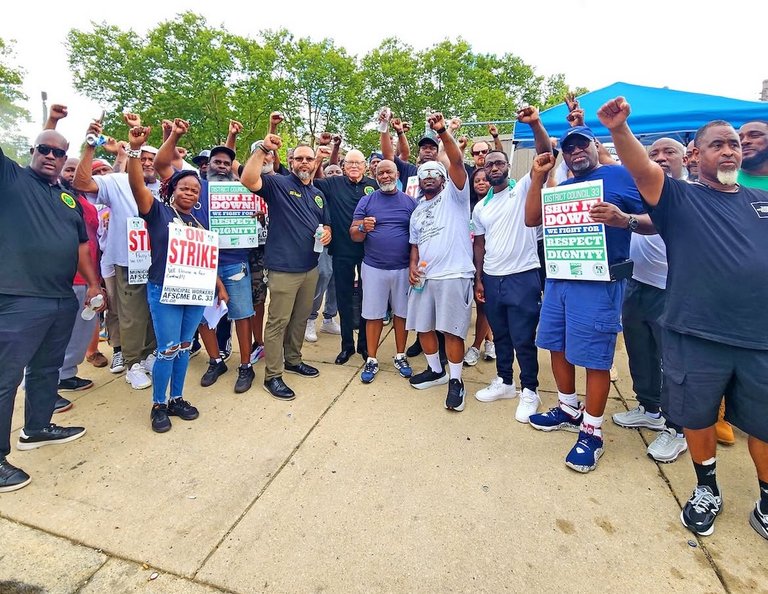Municipal Workers Strike: Garbage Mountains & A Fight for Fair Pay

Philadelphia workers on Strike — And the Trash Is Piling Up
Nearly 10,000 city workers in Philadelphia are on strike after their contract expired at midnight on July 1. Represented by AFSCME District Council 33 (DC 33), they include sanitation workers, crossing guards, 911 dispatchers, and other essential municipal employees.
As of July 9, trash is piling up on city streets, pools and libraries have closed, and basic city services are disrupted. Temperatures are above 90°F (32°C), and the growing garbage heaps have become a flashpoint of frustration—dubbed “Parker piles,” after Mayor Cherelle Parker, who has taken a hardline stance.
Why They’re Striking
DC 33 is demanding annual 5 percent wage increases over three years, citing the high cost of living and the fact that many members qualify for public assistance despite working full-time city jobs. The average salary for a DC 33 member is around $46,000.
The city has offered annual raises of 2.75, 3, and 3 percent, which workers say falls short of inflation and is out of step with the city’s available budget. The union points to other areas of city spending as evidence that fairer pay is possible.
Public Response and Historical Context
This is the first major strike by DC 33 since 1986, when sanitation workers walked off the job for nearly three weeks, leaving 45,000 tons of garbage uncollected.
DC 33 is Philadelphia’s largest city union, with a predominantly Black membership. Many residents, particularly in working-class neighborhoods, have expressed support for the strike and blame the mayor for the breakdown in negotiations.
The strike disrupted the city’s annual Fourth of July celebration. Headliners LL Cool J and Jazmine Sullivan declined to perform in solidarity with striking workers after learning they would be crossing picket lines.
Legal and Political Pressure
On July 3, a judge issued an injunction forcing certain essential workers—like 911 dispatchers and water department employees—back to work. However, sanitation and many other services remain halted.
Mayor Parker has said she will not raise taxes to fund higher wages, framing the union’s demands as fiscally irresponsible. The union argues that the administration’s budget priorities fail to reflect the city’s dependence on its essential workforce.
Why It Matters
This strike spotlights a national issue: how cities undervalue the labor that keeps them running. DC 33’s demands are part of a broader wave of municipal labor actions pushing back against stagnant wages, rising living costs, and post-pandemic austerity.
The outcome of this strike could influence how other cities handle public-sector bargaining in the months to come.
Absolutely — here are the main verified sources that support the rewritten Hive-style post. These are reputable outlets that reported directly on the strike, its context, and key figures:
Primary Sources
Jacobin
- Title: “In Philadelphia, City Workers Are on Strike — and the Trash Is Piling Up”
- Author: Mindy Isser
- Date: July 8, 2025
- Link to article
The Guardian (Opinion)
- Title: “Something stinks in Philadelphia — and not just the uncollected garbage”
- Author: Mindy Isser
- Date: July 9, 2025
- Link to article
Associated Press (AP)
- Title: “Garbage piles up as Philadelphia city workers strike for better pay”
- Date: July 3–5, 2025
- Archived via APNews
Wikipedia
- Title: 2025 District Council 33 strike
- Updated: Ongoing coverage and background on AFSCME DC 33 and past strikes
- Link to article
https://www.reddit.com/r/antiwork/comments/1lvigus/municipal_workers_strike_garbage_mountains_a/
This post has been shared on Reddit by @uwelang through the HivePosh initiative.
Congratulations @newsgeek! You have completed the following achievement on the Hive blockchain And have been rewarded with New badge(s)
Your next target is to reach 30 posts.
You can view your badges on your board and compare yourself to others in the Ranking
If you no longer want to receive notifications, reply to this comment with the word
STOP